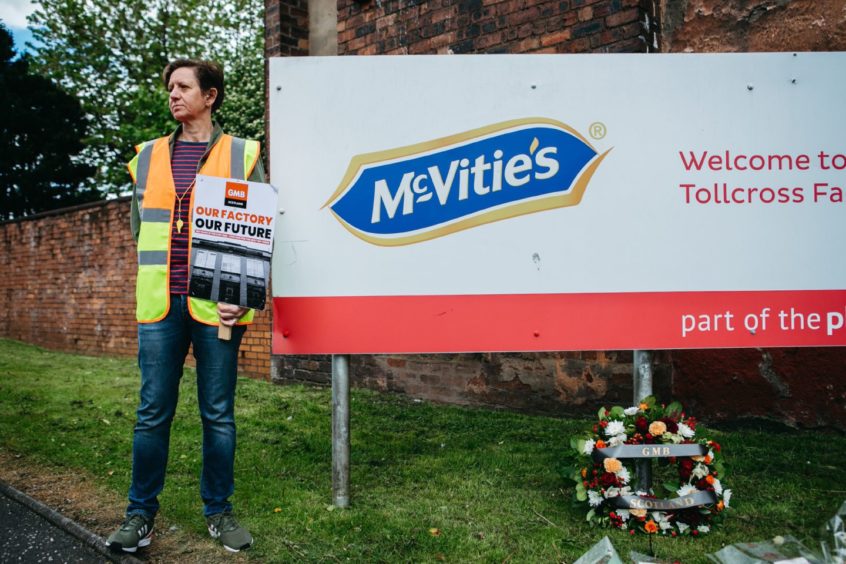
The planned closure of a historic biscuit factory could cost double the number of jobs first predicted and cost the Scottish economy £50 million a year, analysis reveals.
Detailed research suggests another 400 jobs in firms supported by the factory are at risk in addition to 470 workers directly threatened at the McVitie’s plant at Tollcross, Glasgow.
The total financial impact of closure has also been gauged to be £49 million per year. The figure consists of £26.8m which the factory directly contributes to the economy annually, plus £6.2m generated in supply chain work such as contracts to make packaging. A further £16m could be lost in cash linked to spending by both those directly and indirectly employed by the site.
Experts said the ripple effects of closure would be felt locally and nationally, while unions described the planned closure as “an economic time bomb”.
They are working with a Scottish Government and Glasgow City Council-led action group which has been set up to encourage McVitie’s owners, Turkish-owned conglomerate Pladis, to rethink their plans.
Business experts have also been enlisted to help with a counter proposal which it is hoped would see either investment in the existing site at Tollcross, in Glasgow’s East End, or a move to a greenfield site nearby.
It is hoped a fully-costed counter-proposal to closure could be submitted next month. Meanwhile, staff staged a demo outside Marks & Spencers in Glasgow’s Argyle Street yesterday to highlight the retail giant’s status as a major McVitie’s customer. Unions have written to M&S, which has products including biscuits and teacakes manufactured under contract at the Tollcross factory, to seek backing for keeping the work in Glasgow.
David Hume, Scottish organiser with union GMB, which represents several hundred McVitie’s staff, said: “Pladis’s plan to close this factory would not just be disastrous for the people who work there, who have worked hard all through the pandemic, and the immediate area, but would also affect contractors and suppliers, such as people who supply cardboard, pallets and so on. Analysis shows this factory is worth £50m per year to the economy. Closure would be an economic time bomb in a particularly fragile area and at a time when we are attempting to recover from the pandemic.
“We welcome the fact we have the Scottish Government and local council’s full backing and commitment to save these jobs. We are also asking M&S to use their influence as a customer of Pladis to try to avert this closure. We need the community on board as well and we will be continuing the fight over the coming weeks.”
- July 11, 2021
- July 4, 2021
- May 30, 2021
- May 23, 2021
Paul Sweeney MSP, Scottish Labour’s shadow minister for employment, said: “Closure would have a serious effect across the community and far beyond and we must do everything we can to retain these jobs.
“We need Pladis to fully engage with the action group and I believe the situation requires to be escalated to the First Minister to take up the cudgel and intervene directly with Pladis. It may well be that a new-build factory is the best option. I am certain there is a deal to be done here to save these jobs.”

The economic data on the effects of closure was compiled by Glasgow City Council, whose leader, councillor Susan Aitken is also co-leader, along with Finance Secretary Kate Forbes, of the Pladis Action Group.
The council’s detailed analysis reveal that, in addition to 472 jobs at the plant, 110 jobs currently involved in supply chain work would also likely be hit. It is anticipated closure would also cost a further 283 so-called “induced job losses”, due to the loss of spending caused by closure. It would bring the total jobs lost, locally and nationally, due to closure of the factory to 864.
Aitken said that would be devastating for the city: “The potential closure of the McVitie’s factory would not only be a huge blow to the workers and their families, but also on all those firms and workers linked to the factory.
“This is why we are working alongside the Scottish Government, Scottish Enterprise, and the unions to explore different options with Pladis that could safeguard the workforce and site there.”
Similar research by the Fraser of Allander Institute, Scotland’s leading economic thinktank, has estimated around 700 jobs are under threat.
A source close to negotiations to save the plant added: “A business expert has been drafted in to provide analysis and to help with compiling a counter proposal. It’s hoped that the person brought in will add to the counter proposal and give it a greater chance of succeeding.”
It is estimated a fully-costed submission on the counter proposal will be submitted next month.
Pladis announced plans in May to shut the factory “subject to consultation”. Unions accused the firm, which last year reported profits had risen to £186m, of stabbing workers in the back after staff had worked on to increase production during the pandemic, only to be told they were losing their jobs at the end of it.
Unions have also accused Pladis of manufacturing the case to shut Tollcross by only focusing on indicators in which the factory does less well in comparison to sites in England to which Pladis want to switch production.
Biscuits have been produced on the Tollcross site for almost a century, when it opened as a factory for predecessor firm McFarlane Lang in 1925.
The world-famous McVitie’s biscuit brand traces its origins to a single shop opened by Robert McVitie, backed by his father William, in Edinburgh’s Rose Street in 1839. Business boomed and the secret recipe for the Digestive biscuit, which remains to this day, was devised by worker Alexander Grant in 1892.
McVitie’s, by then part of United Biscuits, was acquired by Turkish company Yildiz in 2014, who brought together their biscuit and confectionery businesses under the name Pladis two years later.
The financial analysis
Council analysis suggests another 400 jobs dependent on the McVitie’s plant will be lost if the factory closes, in addition to the 472 staff redundancies.
The Fraser of Allander Institute, a leading economic thinktank, suggests the total job losses will be lower at 700 but Mairi Spowage, interim director, believes the impact cannot be underestimated.
She said: “Data on the knock-on effect of job losses can be calculated using so-called input-output tables, which show how industries are linked to other industries. This allows us to examine supply chains and look into the sorts of things which industries tend to buy to be able to produce their goods and services.”
Spowage said the Institute, part of Strathclyde University, estimates the loss of the 470 jobs at the McVitie’s factory could lead to at least 200 other workers facing the axe. She said 120 posts would be at risk due to anticipated losses by companies in the supply chain of the Tollcross factory.
“We can assess what are known as multipliers,” said Spowage. “It shows that for every job lost directly, it can lead to further jobs lost in supply chain in that sector.
“Local firms are likely to be most affected but supply chains can reach across the country.
“An operation like McVitie’s will have suppliers and will, for example, buy raw ingredients. If we lose a factory like this, it’s terrible for those who could lose their jobs there, but it’s also about suppliers. Then you have those who supply the suppliers, and so the ripple effect goes on. It’s like the reverse of generating positive economic multipliers.
“You are instead generating a negative knock-on effect throughout the economy.”
A further 90 jobs, the Institute estimates, could be lost because of a reduction in spending due to unemployment.
“The wages of the workers in the factory and the wages of employees working in the supply chain are spent in shops, or on going out, and so on, and this also disappears in what is known as the induced effect within the economy. It’s especially tragic when it affects a long-standing company such as McVitie’s. Communities can be built around such employers and so closure has a social effect as well as an economic one.”
Spowage said job loss numbers could increase once part-time work was factored in, as estimates were based on full-time equivalent employment.
The snub: Owners accused of consultation sham as they shun taskforce
McVitie’s owners Pladis have refused to attend meetings of the action group set up to try to avert their Glasgow factory’s closure and save 470 jobs.
The group, led by finance secretary Kate Forbes and Glasgow city council leader Susan Aitken, has met three times and is due to meet again.
Sources confirmed to The Sunday Post that Pladis had been invited by Forbes to attend meetings but had declined. The finance secretary has directly appealed to Pladis to engage with the group, which is working on a counter-proposal to closure which could see either investment in the Tollcross site or a move to a new-build factory nearby.
Forbes said: “The action group reaffirmed our shared desire to work together to secure the best possible future for the site and its workforce. We are carefully considering the next steps and what more we can do to support affected staff and secure these jobs.
“The Scottish Government, trade unions and our enterprise agencies remain committed to working with the company during the consultation period and are preparing alternative options for Pladis to consider. I would once again ask Pladis to engage directly with the action group to explore opportunities to secure a future for the site.”
While they have snubbed the action group, representatives from Turkish-owned Pladis had telephone calls with the finance secretary and city council leader on May 24 and June 7 and have also been in touch with Scottish Enterprise.
Pladis said: “We continue to engage with our employees and their representatives on a weekly basis and remain committed to a meaningful consultation with them. We have also been engaging directly with the co-chairs of the action group, cabinet secretary Kate Forbes and councillor Susan Aitken, on a regular basis.”

Enjoy the convenience of having The Sunday Post delivered as a digital ePaper straight to your smartphone, tablet or computer.
Subscribe for only £5.49 a month and enjoy all the benefits of the printed paper as a digital replica.
Subscribe © Andrew Cawley
© Andrew Cawley © Andrew Cawley
© Andrew Cawley © SYSTEM
© SYSTEM © Andrew Cowan/Scottish Parliament
© Andrew Cowan/Scottish Parliament